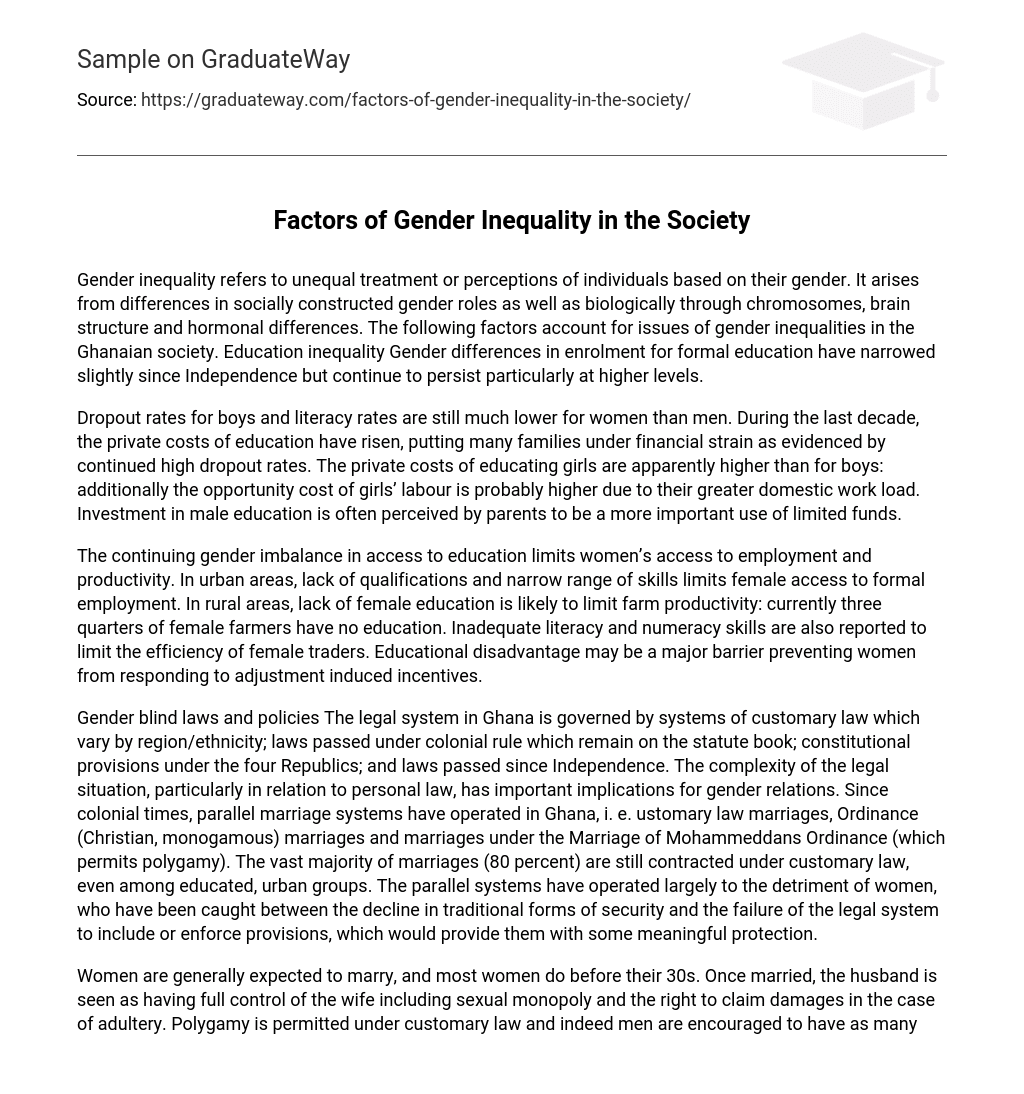Gender inequality refers to unequal treatment or perceptions of individuals based on their gender. It arises from differences in socially constructed gender roles as well as biologically through chromosomes, brain structure and hormonal differences. The following factors account for issues of gender inequalities in the Ghanaian society. Education inequality Gender differences in enrolment for formal education have narrowed slightly since Independence but continue to persist particularly at higher levels.
Dropout rates for boys and literacy rates are still much lower for women than men. During the last decade, the private costs of education have risen, putting many families under financial strain as evidenced by continued high dropout rates. The private costs of educating girls are apparently higher than for boys: additionally the opportunity cost of girls’ labour is probably higher due to their greater domestic work load. Investment in male education is often perceived by parents to be a more important use of limited funds.
The continuing gender imbalance in access to education limits women’s access to employment and productivity. In urban areas, lack of qualifications and narrow range of skills limits female access to formal employment. In rural areas, lack of female education is likely to limit farm productivity: currently three quarters of female farmers have no education. Inadequate literacy and numeracy skills are also reported to limit the efficiency of female traders. Educational disadvantage may be a major barrier preventing women from responding to adjustment induced incentives.
Gender blind laws and policies The legal system in Ghana is governed by systems of customary law which vary by region/ethnicity; laws passed under colonial rule which remain on the statute book; constitutional provisions under the four Republics; and laws passed since Independence. The complexity of the legal situation, particularly in relation to personal law, has important implications for gender relations. Since colonial times, parallel marriage systems have operated in Ghana, i. e. ustomary law marriages, Ordinance (Christian, monogamous) marriages and marriages under the Marriage of Mohammeddans Ordinance (which permits polygamy). The vast majority of marriages (80 percent) are still contracted under customary law, even among educated, urban groups. The parallel systems have operated largely to the detriment of women, who have been caught between the decline in traditional forms of security and the failure of the legal system to include or enforce provisions, which would provide them with some meaningful protection.
Women are generally expected to marry, and most women do before their 30s. Once married, the husband is seen as having full control of the wife including sexual monopoly and the right to claim damages in the case of adultery. Polygamy is permitted under customary law and indeed men are encouraged to have as many wives as they can afford. Within Ghanaian households, in Customary Law, the husband is under an obligation to maintain his wives and children.
In return, a wife and her children are obliged to assist the husband/father in his chosen trade or profession, although they do not become joint owners of the resulting property acquired. Power imbalance/unequal power relations Ghanaian women are effectively under the control or authority of men (initially their father or other male members of their kin group and later their husband) for much of their lives, although they may gain in status and influence with age. As a result, women’s decision making role in Ghana is constrained in both private and public spheres, markedly so in the northern regions.
In post-Independence governments, women have also been under-represented at all levels. Recent exercises in decentralization, the establishment of a new multi-party constitution and general elections, provide opportunities for women to participate more actively in the formal political process, but there is little evidence as yet to show clearly that this has occurred. TheGender inequality refers to uneq at local level has probably increased considerably, from a very low level. However, the reinforcement of alliances b





